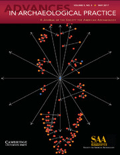
Advances in Archaeological Practice
metrics 2024
Innovating the Future of Archaeology
Introduction
Advances in Archaeological Practice, published by Cambridge University Press, is a leading journal in the field of archaeology, emphasizing innovative approaches and methodologies that advance archaeological research. With an ISSN of 2326-3768 and a commendable Q1 ranking in both the Arts and Humanities and Social Sciences categories, the journal effectively bridges theoretical perspectives and practical applications, positioning itself at the forefront of archaeological scholarship. Researchers and professionals can benefit from its high-impact content, reflected in its 93rd percentile ranking in the field, making it an essential resource for those aiming to stay abreast of the latest insights and practices. Although it operates under a subscription model, the quality and relevance of its publications ensure it plays a crucial role in shaping the discourse within the archaeological community and beyond, facilitating access to cutting-edge research that enhances our understanding of past human activities.
Metrics 2024
 0.81
0.81 1.90
1.90 1.80
1.80 17
17Metrics History
Rank 2024
Scopus
JCI (Web Of Science)
Quartile History
Similar Journals
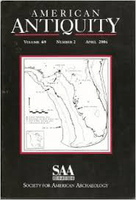
AMERICAN ANTIQUITY
Shaping the Future of Archaeological Discourse.AMERICAN ANTIQUITY, published by Cambridge University Press, stands as a premier journal in the fields of archaeology, arts and humanities, history, and museology. With an enduring legacy since its inception in 1935, this journal has consistently ranked in the Q1 category across several disciplines, reflecting its significant impact and authority in shaping contemporary scholarly discourse. It boasts impressive Scopus rankings, placing it in the 99th percentile for archaeology and history, which underscores its critical role in advancing research and understanding of American archaeology and related fields. Although it does not currently offer open-access options, the journal remains a vital resource for researchers, professionals, and students seeking high-quality, peer-reviewed content. As it converges toward 2024, AMERICAN ANTIQUITY continues to foster innovative scholarship and preserve knowledge, making it an essential reading for anyone invested in the exploration of cultural heritage and historical narratives.

Yorkshire Archaeological Journal
Connecting the Dots of Yorkshire's Archaeological HistoryYorkshire Archaeological Journal, published by Routledge Journals, Taylor & Francis Ltd, stands as a pivotal resource in the field of archaeology, particularly focused on the rich heritage and archaeological research within the Yorkshire region of the United Kingdom. With a dedicated ISSN of 0084-4276 and an E-ISSN of 2045-0664, this journal provides both researchers and practitioners valuable insights into archaeological discoveries, methodologies, and theoretical frameworks. While it holds a Q3 ranking in both Archaeology (Arts and Humanities) and Archaeology (Social Sciences), its contributions remain significant for advancing discussions and knowledge within the discipline. The journal's archival depth, converging from as early as 1980 and continuing robustly into 2024, showcases a commitment to fostering academic discourse and exploration of archaeological heritage. Although it does not currently offer open access, its rigorous peer-reviewed articles make it an essential reference for academics, professionals, and students alike who are eager to deepen their understanding of archaeology and its applications.

Studijne Zvesti Archeologickeho Ustavu Slovenskej Akademie Vied
Exploring Slovakia's rich heritage through scholarly research.Studijne Zvesti Archeologickeho Ustavu Slovenskej Akademie Vied is a leading journal in the field of archaeology, published by the SLOVENSKA AKAD VIED, ARCHEOLOGICKY USTAV, based in Nitra, Slovakia. This esteemed journal, with the ISSN 0560-2793, has established itself as a vital resource for scholars and researchers, reflecting significant academic contributions in both the arts and humanities as well as social sciences. With a 2023 Scopus ranking placing it in the second quartile (Q2) for archaeology, it showcases rigorous research and innovative methodologies, essential for advancing archaeological studies. While it is not an Open Access journal, it continues to offer valuable insights into archaeological findings, theoretical frameworks, and interdisciplinary approaches. The journal serves as a bridge, connecting local Slovak archaeology with international discourse, making it an indispensable tool for students, professionals, and academics striving for a deeper understanding of the archaeological heritage of Slovakia and beyond.
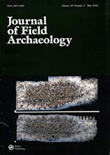
JOURNAL OF FIELD ARCHAEOLOGY
Pioneering Insights into Ancient CivilizationsJOURNAL OF FIELD ARCHAEOLOGY, published by Routledge Journals, Taylor & Francis Ltd, is a premier scholarly publication dedicated to advancing the field of archaeology. With an impressive impact factor reflecting its significant contributions to both the arts and humanities, this journal ranks in the Q1 category for archaeology, with a remarkable position of #21/413 in the arts and humanities realm and #19/354 in social sciences, placing it in the 95th percentile among its peers. Catering to researchers, professionals, and students alike, the journal has continuously explored critical archaeological questions since its inception in 1974, with a commitment to disseminating high-quality research and innovative methodologies up to the present. Although it operates under a traditional access model, the journal engages a broad readership with its insightful studies and findings, making it an essential resource for anyone deeply involved in archaeology and its related disciplines.
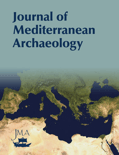
Journal of Mediterranean Archaeology
Unveiling the Rich Tapestry of Mediterranean CulturesThe Journal of Mediterranean Archaeology, published by EQUINOX PUBLISHING LTD in the United Kingdom, is a premier academic journal dedicated to the exploration and dissemination of knowledge within the vibrant field of Mediterranean archaeology. Established in 1988, this journal has consistently demonstrated its commitment to scholarly excellence, attaining a Q1 ranking in various categories, including Archaeology and Arts and Humanities, making it a vital resource for researchers and students alike. With a prominent Scopus rank of #49 out of 413 in Archaeology, it places itself among the top-tier publications, reflecting its impact and relevance in contemporary archaeological discourse. Although the journal is not open access, its rigorous peer-review process ensures the publication of high-quality scholarly articles that contribute significantly to the understanding of the diverse cultural narratives within the Mediterranean region. As the journal moves toward its 35th anniversary, it continues to be a cornerstone for professionals seeking to share groundbreaking research and dialogue in this critically important area of study.
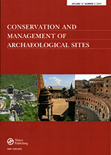
Conservation and Management of Archaeological Sites
Preserving the Past, Shaping the Future.Conservation and Management of Archaeological Sites is a pivotal academic journal published by Routledge Journals, Taylor & Francis Ltd, focusing on the interdisciplinary fields of archaeology and conservation. With an ISSN of 1350-5033 and an E-ISSN of 1753-5522, this journal strives to publish high-quality research that addresses critical topics related to the conservation and management of archaeological sites, fostering dialogue between practitioners, researchers, and policymakers. Despite being categorized in the third quartile (Q3) across multiple relevant categories such as Archaeology and Conservation in the 2023 rankings, it remains a significant resource for professionals seeking to enhance their understanding and application of best practices in site management. The journal plays a crucial role in disseminating knowledge that contributes to the preservation of cultural heritage, making it an essential read for anyone involved in these vital fields. Published since 1995, the journal not only reflects the growing importance of archaeology in today's society but also provides a platform for emerging research that will shape future conservation strategies.
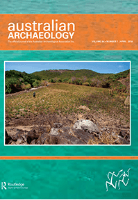
AUSTRALIAN ARCHAEOLOGY
Illuminating Australia’s Archaeological Treasures.AUSTRAILIAN ARCHAEOLOGY, published by Taylor & Francis Ltd, is a leading academic journal dedicated to the field of archaeology. With a strong reputation as evidenced by its Q1 ranking in both the Arts and Humanities and Social Sciences categories, this journal fosters the growth and dissemination of pioneering research from diverse archaeological contexts. The journal has been a vital resource for scholars and practitioners since its convergence in 2002, supporting the collective advancement of knowledge in the archaeological discipline. By offering a platform for rigorous analysis and critical discussions, AUSTRAILIAN ARCHAEOLOGY appeals to a wide audience, from established researchers to students beginning their journey in archaeology. Although it is not an Open Access journal, the insights provided are invaluable for enhancing understanding and appreciation of Australia’s rich archaeological heritage. With a Scopus ranking that places it among the top contenders in its field, this journal continues to contribute significantly to outstanding archaeological scholarship and professional practice.
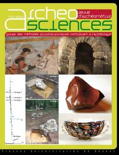
ArcheoSciences-Revue d Archeometrie
Unveiling the Past: Bridging Science and ArchaeologyArcheoSciences-Revue d Archeometrie is a prominent scholarly journal dedicated to the field of archaeology, published by PRESSES UNIV RENNES in France. With an ISSN of 1960-1360 and an E-ISSN of 2104-3728, this journal has gained recognition for its focus on the intersection of science and archaeological research, aiming to foster interdisciplinary dialogue and innovative methodologies within archaeological studies. Although coverage of the journal has been discontinued in Scopus post-2021, it has maintained a respectable standing with a Q3 Quartile ranking in both the Archaeology (Arts and Humanities) and Archaeology categories as of 2023, as well as commendable Scopus rankings in relevant fields. As an accessible platform for researchers, professionals, and students, ArcheoSciences offers valuable insights into applied techniques and findings in archaeological science, making it an essential resource for those involved in the historical and cultural analysis of material relics. Researchers are encouraged to explore this journal to stay informed about frontier research and ongoing discussions in the discipline.

Annales Instituti Archaeologici
Exploring the Depths of History, One Study at a TimeAnnales Instituti Archaeologici is a distinguished journal published by INST ARHEOLOGIJU, dedicated to advancing research in the field of archaeology. With an ISSN of 1845-4046 and an E-ISSN of 1848-6363, this journal serves as a vital platform for the dissemination of innovative archaeological studies and findings, reflecting the evolving trends and methodologies in this fascinating discipline. Based in Croatia, the journal captures a global audience, emphasized by its Q3 ranking in both Archaeology categories as per the latest 2023 metrics, indicating a solid presence in the academic landscape. Although it does not currently offer Open Access options, its impactful contributions are recognized through its Scopus ranks, where it stands at #137/413 in Archaeology related to Arts and Humanities and #135/354 in Social Sciences. Researchers, professionals, and students interested in the latest archaeological research and its applications will find Annales Instituti Archaeologici to be an invaluable resource, promoting knowledge and fostering scholarly communication within the archaeological community.
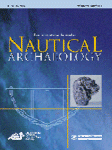
INTERNATIONAL JOURNAL OF NAUTICAL ARCHAEOLOGY
Exploring the Depths of Maritime HeritageWelcome to the International Journal of Nautical Archaeology, a premier peer-reviewed publication dedicated to advancing the study of maritime history and underwater archaeology. Published by Taylor & Francis Ltd, this esteemed journal, indexed with an ISSN of 1057-2414 and an E-ISSN of 1095-9270, serves as a vital platform for researchers, professionals, and students alike. Celebrated for its rigorous scholarship, the journal ranks in the top quartile for both Archaeology and History in 2023, reflecting its influential role within the academic community. Covering a broad spectrum of topics from ancient shipwrecks to contemporary marine archaeology practices, the journal aims to foster interdisciplinary dialogues that enrich our understanding of humanity's maritime heritage. With a publication history dating back to 1972, it continues to thrive as a key resource in the field. Although currently not offering Open Access, the insights published in this journal are invaluable for those seeking to explore the intersections of archaeology and oceanography, making it a must-read for anyone engaged in or studying these dynamic disciplines.